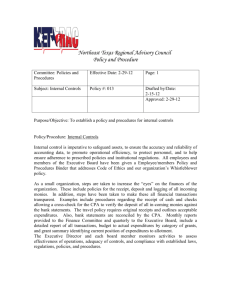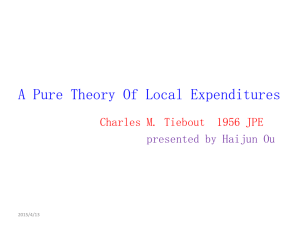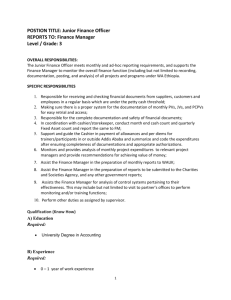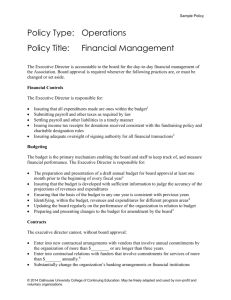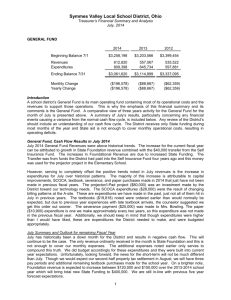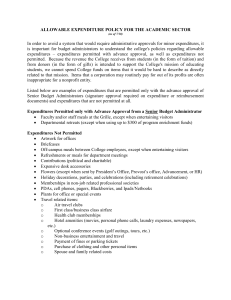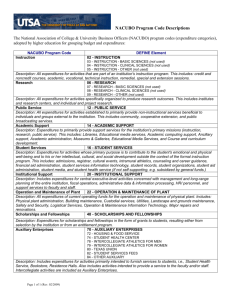Functional Categories of Expenditures
advertisement
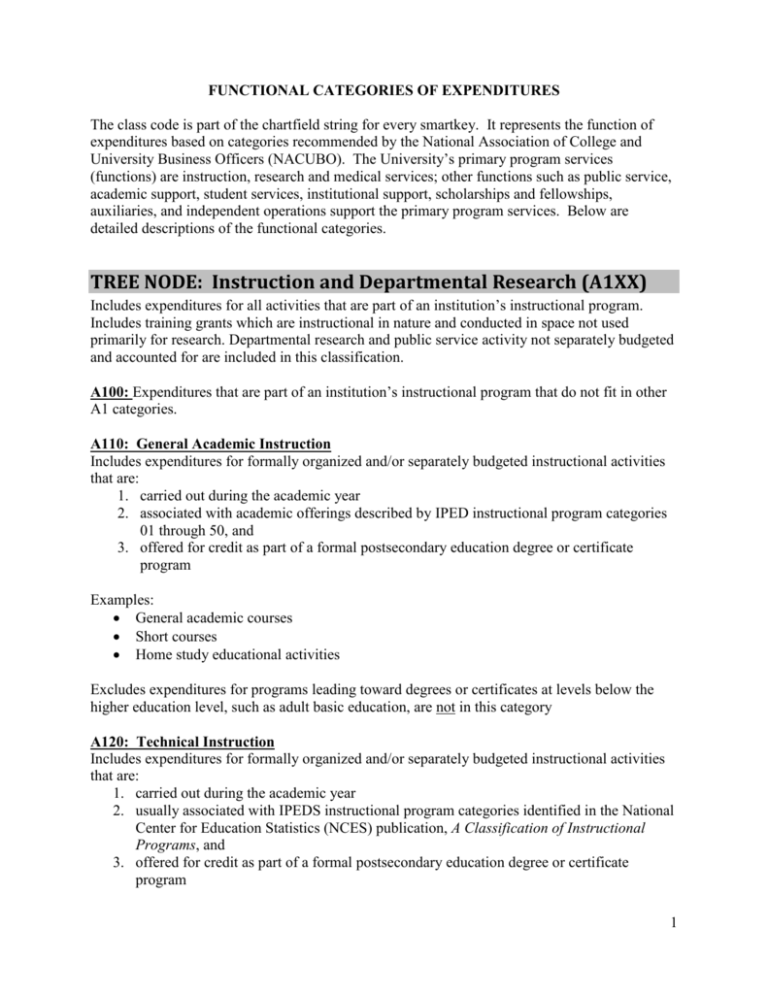
FUNCTIONAL CATEGORIES OF EXPENDITURES The class code is part of the chartfield string for every smartkey. It represents the function of expenditures based on categories recommended by the National Association of College and University Business Officers (NACUBO). The University‟s primary program services (functions) are instruction, research and medical services; other functions such as public service, academic support, student services, institutional support, scholarships and fellowships, auxiliaries, and independent operations support the primary program services. Below are detailed descriptions of the functional categories. TREE NODE: Instruction and Departmental Research (A1XX) Includes expenditures for all activities that are part of an institution‟s instructional program. Includes training grants which are instructional in nature and conducted in space not used primarily for research. Departmental research and public service activity not separately budgeted and accounted for are included in this classification. A100: Expenditures that are part of an institution‟s instructional program that do not fit in other A1 categories. A110: General Academic Instruction Includes expenditures for formally organized and/or separately budgeted instructional activities that are: 1. carried out during the academic year 2. associated with academic offerings described by IPED instructional program categories 01 through 50, and 3. offered for credit as part of a formal postsecondary education degree or certificate program Examples: General academic courses Short courses Home study educational activities Excludes expenditures for programs leading toward degrees or certificates at levels below the higher education level, such as adult basic education, are not in this category A120: Technical Instruction Includes expenditures for formally organized and/or separately budgeted instructional activities that are: 1. carried out during the academic year 2. usually associated with IPEDS instructional program categories identified in the National Center for Education Statistics (NCES) publication, A Classification of Instructional Programs, and 3. offered for credit as part of a formal postsecondary education degree or certificate program 1 Examples: Open University courses Short courses Home study educational activities Excludes expenditures for programs leading toward degrees or certificates at levels below the higher education level, such as adult basic education. A130: Special Session Instruction Includes expenditures for formally organized and/or separately budgeted instructional activities (offered either for credit or not for credit) that are carried out during a summer session, interim session, or other period not common with the institution‟s regular term. This subcategory includes expenditures made solely as a result of conducting a special session (such as faculty salaries associated with the special session). Examples: Lecture series Excludes expenditures for special sessions do not include regular academic terms held during the summer. Expenditures for special sessions conducted over a fiscal year-end should be reported totally within the fiscal year in which the program is predominantly conducted. A140: Community Education Includes expenditures for formally organized and/or separately budgeted instructional activities that do not generally result in credit toward any formal postsecondary degree or certificate. It includes noncredit instructional offering carried out by the institution‟s adult education or continuing education program. This subcategory also includes expenditures for activities associated with programs leading toward a degree or certificate a level below the higher education level, such as adult basic education. Examples: Evening at Emory Non-degree executive education A150: Preparatory Instruction Includes expenditures for formally organized and/or separately budgeted instructional activities that give students the basic knowledge and skills required by the institution before they can undertake formal academic coursework leading to a postsecondary degree or certificate. Such activities, supplemental to the normal academic program, generally are termed preparatory, remedial, developmental, or special educational services. These instructional offerings may be taken prior to or along with the coursework leading to the degree or certificate. They are generally noncredit offerings, although in some cases credit may be given and the credit requirements for the degree or certificate increased accordingly. Only offerings provided specifically for required preparatory or remedial skills or knowledge should be included in this 2 category. For example, if students may satisfy preparatory requirements by taking offerings provided primarily for other than remedial or preparatory purposes, those offerings should be classified appropriately elsewhere. A160: Sponsored Training and Instruction (OGCA is using this NACUBO code only for all Instruction related activities funded by an external sponsor. Includes practical training in other than research techniques such as clinical training and instructional related activities funded from external sponsors. Examples: Pre-doc NRSA Awards A170: General Instructional Support Includes General and administrative expenses of departmental chairpersons, administrators, and faculty for whom instruction is an important role. Expenditures should be incurred in space primarily used in support of instruction. Includes funds for generalized (informal or unspecified) academic support that is not formally organized and/or separately budgeted. Includes immaterial expenditures by individual faculty members which jointly support instruction, research and public service. Costs related to more than one functional category of expense should be relatively nominal. High expenditure account should be split May include funds received from individual donors, and foundations and corporations whose awards are donative in nature (funds that are administered by Development and Alumni Relations) which state no restrictions on the use of the funds AND actual use of the funds are not separately budgeted activities included in other specific functional categories of expense A180: Academic Chair Development Includes expenditures for faculty start up and chair development TREE NODE: Research (A2XX) Includes expenditures for organized research and other sponsored research. Departmental research and independent research which is separately budgeted and accounted for is also included in this category. Sponsored research – (funds that are administered by the Office of Sponsored Programs and/or Office of Grants and Contracts Accounting). Includes expenditure of funds from federal, state and local governments and „flow-through‟ agencies. (Usually coded A220 – Individual or Project research of A230 – Other sponsored activities.) Internal application of funds (unrestricted funds) and restricted gifts for research. 3 A200: Expenditures for organized research that do not fit in other A2 categories. A210: Institutes and Research Centers Includes expenditures for research activities or research efforts. While this subcategory includes the agricultural experiment station, it does not include federally funded research and development centers, which should be classified as independent operations. A220: Individual and Project Research Includes many federally funded research projects. Includes unrestricted funds used to sponsor competitive research Examples: EMCF research grants BRSG Emory/GA Tech URC grants . Includes K-Awards and Post-doc NRSA awards. A230: Research Services Includes external funding provided to write the workplan for a grant. Funding received to actually perform preliminary work in a research protocol should be classified as research. Includes external funding whose primary purpose is to cover the professional services of an Emory employee. Although it mainly covers the direct costs of salary and fringe, other costs are sometimes included. A240: Independent Department Research Includes funds received from individual donors, foundations, and corporations whose awards are donative in nature (funds that are administered by Development & Alumni Relations) in which the donor states funds should be used to support research activities. Accounts coded A240 are used exclusively for a researcher that has no externally sponsored research project. Includes unrestricted funds (no external specification to use the funds for research), used primarily in support of research activities. Includes start-up funds which are used to establish research laboratories. Includes funds that are separately budgeted and accounted for (have a separate account) that are in general support of the research activities of the University. A250: Departmental Research Includes funds received related to Intergovernmental Personnel Agreements (IPAs) A260: Clinical Research Funds from federal sponsors that support clinical research conducted primarily in research lab space as opposed to clinical patient care space. Includes clinical research where Emory has a 4 research protocol – Emory instigated and is actually conducting the research (not just gathering the data) A270: Externally Sponsored Research Subject to Unrelated Business Income Tax and/or Private Use Considerations Applies to research, clinical trials, etc. funded in part or in whole by a third party (especially by a commercial enterprise) where (a) any of the facilities used are financed by tax-exempt bonds and (b) specific exclusions or exemptions do not apply under the Internal Revenue Code. TREE NODE: Public Service (A3XX) Includes funds expended for activities that are primarily to provide noninstructional services beneficial to individuals and groups external to the institution. Examples: conferences, institutes, consulting, and similar noninstructional services to particular sectors of the community A300: Funds expended for activities that are established primarily to provide noninstructional services to groups or individuals external to the institution that do not fit in other A3 categories. A310: Community Services Includes activities organized and carried out to provide general community services, excluding instructional activities. These activities make available to the public various resources and special capabilities that exist within the institution. A320: Cooperative Extension Service Not used by Emory A330: Clinical Trials Includes clinical trials where the drug company is the primary researcher. Emory‟s involvement is rather limited – provides statistical counts, check records, etc. A340: Social and Cultural Development Expenses for community development activities that are separately budgeted and generally do not result in credit toward any formal postsecondary degree or certificate. Includes expenses that enhance or educate the general community in ways other than postsecondary degree or certificate. A350: Other Sponsored Studies excluding Clinical Trials Includes Business School consulting contracts. Includes monographs and reports where primary purpose of the project is to write a report. It is not intended to include the scientific report performed as the outcome of a research project. 5 TREE NODE: Academic Support (A4XX) Limit coding of A4XX to funds specifically designed, formally organized and separately budgeted for institutionally provided academic support activities. A410: Libraries Includes expenditures for organized activities that directly support the operation of a catalogued or otherwise classified collection. A420: Museums & Galleries Includes expenditures for organized activities that provide for the collection, preservation, and exhibition of historical materials, art objects, scientific displays, etc. Excludes Libraries A430: Educational Media Services Includes expenditures for organized activities providing multi-media services. A440: Academic Computing Support Includes expenditures for formally organized and/or budgeted activities that provide computing support to the University‟s three primary programs (instruction, research, and public service). Excludes administrative computing which is part of Institutional Support. A450: Ancillary Support Included expenditures for organized activities that provide a mechanism through which students can gain practical experience, i.e. demonstrative school associated with the school of education. Excludes expenditures of teaching hospitals A460: Academic Administration Academic administration specifically designed and carried out to provide administrative and management support to academic programs – i.e. academic deans office and academic advising. A470: Academic Personnel Development Formally organized and/or separately budgeted activities to provide faculty with personal and professional growth and development – i.e. faculty awards and organized faculty development programs. A480: Course and Curriculum Development Formally organized and/or separately budgeted expenditures that provide significant improvement or add to the University‟s instructional offerings. TREE NODE: Medical Services (A5XX) A510: Medical – Instruction Clinical Instruction 6 Grady professional A530: Medical Services – Patient Billing EMCF PIP A550: Medical Unrelated Generally used only by the School of Medicine. A570: Medical Services – Billing Accounts Children‟s Healthcare of Atlanta Emory Healthcare Hospital contracts A580: Other Clinical Related Clinical research and development Clinical teaching and research A590: Clinical Laboratories Medical Genetics Lab Expenses for departmental clinical (patient-related) lab operations TREE NODE: Student Services (A6XX) Includes funds expended for offices of admissions and registrar and those activities whose primary purpose is to contribute to the student‟s emotional and physical well-being and to his or her intellectual, cultural, and social development outside the context of the formal instruction program. A610: Student Services Administration Includes administrative activities that support more than one subcategory of student activities and/or provide central administrative services related to various student activities. Includes services provided for particular types of students such as minority, veterans, and handicap students. Excludes: Universities chief administrative officer for student affairs. Should be classified as institutional support. A620: Social and Cultural Development Includes expenditures for formally organized placement, career guidance, and personal counseling services for students. Excludes formal academic services (academic support) and informal academic counseling services (instruction) provided by the faculty in relation to course assignments. 7 A630: Counseling and Career Guidance Includes expenditures for formally organized placement, career guidance, and personal counseling services for students. Excludes formal academic services (academic support) and informal academic counseling services (instruction) provided by the faculty in relation to course assignments. A640: Financial Aid Administration Includes expenditures for activities that provide financial aid services and assistance to students. Excludes outright grants to students, which should be classified as scholarships and fellowships A650: Student Admissions Includes expenditures for activities related to: The identification of prospective students The promotion of attendance at the institution The processing of applications for admission A660: Student Records Includes expenditures for activities to maintain, handle, and update records for currently and previously enrolled students. A670: Student Health Services Includes expenditures for organized student health services that are not self-supporting rather than those organized as auxiliary enterprises. TREE NODE: Institutional Support (A7XX) Includes expenditures for central executive-level activities concerned with management and long-range planning for the entire institution. Fiscal operations, administrations data processing, space management, employee personnel and records, logistical activities, support services to faculty and staff that are not operated as auxiliary enterprises, and activities concerned with community and alumni relations are included. A710: Executive Management Includes all officers with institution-wide responsibilities such as the president, chief academic officer, chief business officer, chief student affairs officer, and chief development office. A720: Fiscal Operation Includes expenditures for operations related to fiscal control and investments. It includes the accounting office, bursar, and internal and external audits, and also includes such “financial” expenses as allowances for bad debts and short-term interest expenses. A725: Central Cost Allocation 8 Includes the central unit cost allocation charge to revenue generating units within the Emory system. A730: General Administration and Logistical Services Includes expenditures for activities related to general administrative operations and services. It includes personnel administration, space management, purchasing, campus wide communication and transportation services, general stores, printing shops, and safety services. A740: Administrative Computing Support Includes expenditures for computer services that provide support for institution wide administrative functions. A750: Public Relations/Development Includes expenditures for activities to maintain relations with the community, alumni, or other constituents and to conduct activities related to institution wide development and fundraising. TREE NODE: Operations and Maintenance of Plant (A8XX) Includes all expenditures of current operating funds for the operation and maintenance of physical plant, in all cases net of amounts charged to auxiliary enterprises, hospitals, and independent operations. Does not include expenditures made from plant fund accounts. Includes such items as utilities, fire protection, and property insurance. A810: Physical Plant Administration Includes expenditures for administrative activities that directly support physical plant operations. Includes development of plans for expansion or modifications as well as new construction. A820: Building Maintenance Includes expenditures for routine maintenance and repair of building and other structures. A830: Custodial Services Includes custodial services in buildings. A840: Landscape and Grounds Maintenance Includes operation and maintenance of landscape and grounds. A850: Major Repairs and Renovations Includes expenditures related to major repairs, maintenance, and renovations Excludes: Minor repairs (should be classifieds in Building Maintenance subcategory) TREE NODE: Scholarships and Fellowships (A9XX) Includes expenditures for scholarships and fellowships – from restricted or unrestricted current funds – in the form of grants to students, resulting either from selection by the institution or from an entitlement program. It includes trainee stipends to individuals who are enrolled in formal 9 coursework, prizes, and awards. These expenditures should not require any teaching, research, or other service as a condition the payment. Payments are considered compensation for services if the amount represents compensation for past, present, or future employment services; the activity being funded is subject to the direction or supervision of the University; or the payment enables the recipient to pursue studies or research primarily for the benefit of the University. A910: Scholarships Includes expenses from restricted and unrestricted funds in the form of grants to students resulting from selection by the institution or from an entitlement program. These expenses should not require any teaching, research, or other service as a condition of receiving the scholarship. A911: Awards Payments awarded mainly to students based on exceptional academic merit or achievement that is non-compensatory in nature. Awards to faculty and staff employees would most likely be considered compensation. A912: Prizes Payments made generally to students for winning or participating in any type of academic competition or contest that is non-compensatory in nature. Prizes made to faculty and staff employees would most likely be considered compensation. A913: Tuition and Fee Waiver Scholarships expense awarded specifically for tuition or other specific fees that is noncompensatory in nature. A914: Trainee Stipends Expenses to support training for individuals enrolled in formal coursework that is noncompensatory in nature. The expenses are normally processed through “non-compensation” Co. NIH in PeopleSoft payroll (account 57210 - US residents, resident aliens and permanent residents) or (57211 - nonresident aliens). A920: Fellowships Amounts paid for the benefit of an individual to pursue study, training, or research that do not require any teaching, research, or other service as a condition of receiving the fellowship (similar to a scholarship). A921: Grant in Aid Graduate Student – Financial aid paid to graduate students associated with enrollment in an educational program and/or participation in certain institutional activities for research, educational, or cultural purposes. A922: Trainee Stipends Graduate Student - Expenses to support training for individuals enrolled in formal coursework at the Graduate and pre-doctoral or post-doctoral levels that is non-compensatory in nature. 10 TREE NODE: Auxiliary Operations B100: Auxiliary Operations B110: Resident Hall Operations B120: Bookstore Operations B130: Parking Decks TREE NODE: Independent Operations C100: Independent Operations TREE NODE: Optional Classifications Functional Class Codes beginning with “Z” represent functional areas with no Generally Accepted Accounting Principles (GAAP) requirement to disclose the functional nature of related expenditures. However, internal reporting uses the Class Codes to provide reporting capabilities at this level. Optional Class Codes PS Class Class Description Class Tree Node Z001 Bank Accounts Optional Classifications Z110 Capital Construction Projects Optional Classifications Z120 Capital Assets Optional Classifications Z210 Capital Bank Debt Optional Classifications Z610 Endowment Funds Optional Classifications Z710 Trust Funds Optional Classifications Z910 Loan Funds Optional Classifications Z920 Fixed Tuition Plan Optional Classifications Z990 Affiliated Activities Optional Classifications Zxxx: Optional Endowment Classification These codes are assigned to endowment accounts to reflect the category to which the funds are used for support. These codes are used to generate the “School and Purpose Report” for the University and various operating units. General Budget Award Fellowship A B B ZGBD ZAWD ZFEL 11 Scholarship Library Books Lectureship Professorship Student Loan Chair General Department Support Special Program Support Research Other B C D D E F U U U U ZSCH ZLBK ZLEC ZPRF ZSLN ZCHR ZDPT ZPRG ZRSH ZOTR 12
